Prime Minister Yingluck Shinawatra on May 15 presided over the ceremony to mark the end of shackling inmates with iron chains and bars at maximum-security Bang Kwang Central Prison in Nonthaburi, ending a century-old practice which draws ire among rights groups as a human rights violation.
Amnesty International Thailand, an international rights group, hailed the move, saying it marks a good start in complying with international practice on human rights. The rights group also urged the Thai government to end capital punishment to show respect to human dignity and the life of human.
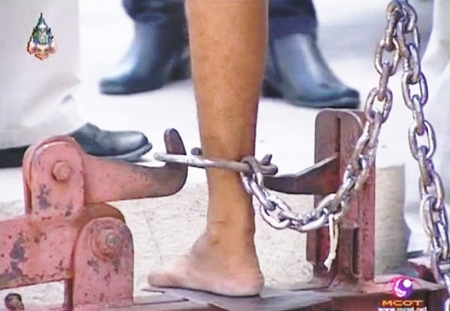
From May 15 onward, there will be no more photographs of prisoners chained with hackles, fetters or leg irons used on the feet or ankles to allow walking but prevent running and kicking. Thailand’s Ministry of Justice Corrections Department decided to discontinue the use of such chains which up to now were used for inmates with serious offences such as those facing execution for murder and those with life imprisonment.
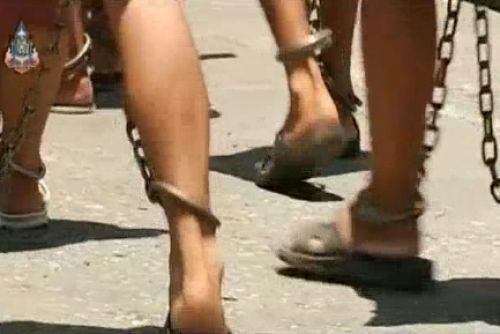
This is to make lives of the inmates easier, and they won’t have to carry their shackles, chains, fetters 24 hours a day while confined in jail.
“The chains are about 10 millimetres thick. There’s also a smaller size of 4.75 millimetres, and another size, 17 millimetres, weighing about 4 kilos”, said Kritapon Siripongpan, a warder at Klong Prem Central Prison.
The size of the fetters depends on how serious the offence of a prisoner is, the guard explained.
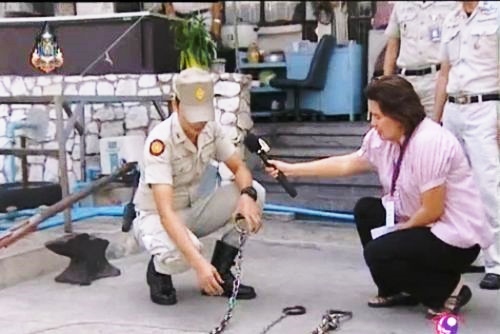
An inmate being held for a serious crime at Klong Prem Central Prison said the most difficult part to living his life in shackles is taking showers, if he is not careful, his skin rubs against the iron and he’s cut, scratched or bruised.
“I must take care of my fetters to prevent rust. Otherwise, I’ll have cuts and wounds. I have to use soap or a scourer to clean them and prevent rust,” said the inmate.
Another warder at Klong Prem Central Prison said he accepted that once all the shackles are out, closer monitoring and control of prisoners will be needed so that they do not try to escape or break prison walls. However, the guard said he is not worried, for the inmates will have better mental health, once free from their chains, and hate their warders less.
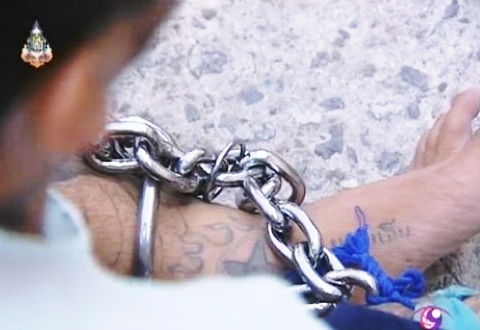
“Prisoners trying to run away make arrangements with their friends to climb over the wall, try to find any piece of wood or anything that they can use to successfully escape. That’s why we have to shackle them,” said Adisorn Kunupatam, director of the prison’s control unit.
Scrapping the use of fetters for prisoners serving life imprisonment or awaiting capital punishment will allow Thailand’s notorious prisoners with the most serious crime cases to be free from their chains. Among them are Chalor Kerdted, a former police general who was convicted of ordering the murder of the wife and son of a gem dealer involved in the ‘Blue Diamond’ theft which has strained diplomatic ties between Thailand and Saudi Arabia since 1989.

The Supreme Court upheld the ruling and sentenced former general Chalor to death in 2009. Six other officers were also found guilty of involvement in the murders. The once lieutenant-general’s sentence was reduced to life imprisonment in 2010 by King Bhumibol Adulyadej on the occasion of his 83th birthday anniversary and reduced to 50 years in 2011.
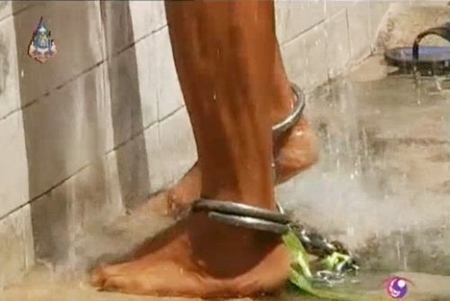
In another case, former gynaecologist Wisut Boonkasemsanti, who killed his wife, also a doctor, and dissected her body in 2001. He must serve a further 19 years in prison following a royal pardon in 2011. He was initially sentenced to death for being found guilty of murdering his wife in a marital dispute.
“The fetters do not only chain you physically but also mentally, deeply, worsening the death sentence you already bear. Taking all these shackles off will help encourage better mental health among prisoners. I’m certain they will show remorse for their sins and try to change their behaviour. We can say that the fetters are our 33rd bodily organ that we must take care of,” said Dr Wisut, the medically-trained prisoner who obviously knows more physiology than his fellow inmates.
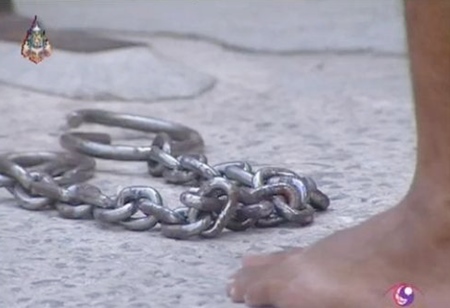
This project began at Nonthaburi’s Bang Kwang Central Prison which houses the highest number of death row inmates. The scheme will gradually continue at all prisons countrywide.
From now on, fetters and handcuffs will only be used for distraught prisoners or those who try to break out of jail or escape on their way to go to trial.




